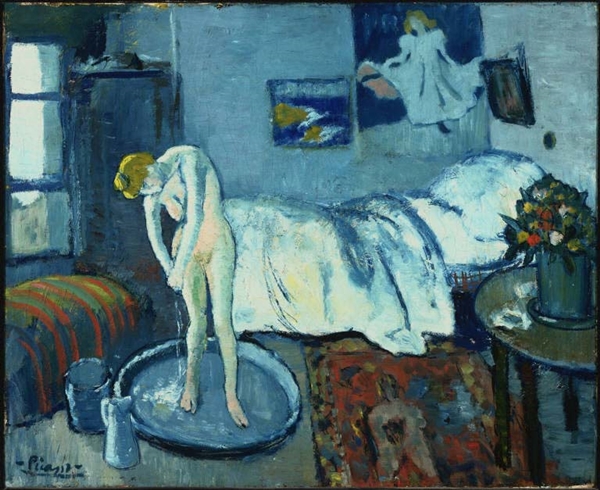
Courtesy the Phillips Collection, Washington, DC.
Experts have authenticated a new painting by Pablo Picasso—hidden beneath an existing 1901 work, The Blue Room, reports the BBC.
A team of scientists and conservators at the Phillips Collection in Washington, DC, uncovered the lost masterpiece, which they had unwittingly owned since 1927, with the help of infrared technology. Like The Blue Room, the newly discovered work, a portrait of an unidentified man dressed in a bow-tie, resting his head on his hand, dates to the artist’s Blue Period (1900–04), when he was living in Paris.
A hidden portrait by Pablo Picasso hovers beneath the surface of The Blue Room, and can be seen thanks to infrared technology.
Photo: courtesy the Phillips Collection, Washington, DC/AP.
In an interview with the AP, curator Susan Behrends Frank explained why the artist would have painted over a completed work: “He could not afford to acquire new canvasses every time he had an idea that he wanted to pursue. He worked sometimes on cardboard because canvas was so much more expensive.”
“It’s really one of those moments that really makes what you do special,” conservator Patricia Favero told the BBC, describing what it was like to first see the missing portrait.
Assisting the team from Phillips were experts from the National Gallery of Art, Cornell University, and Delaware’s Winterthur Museum, who have been examining the painting since 2008. Conservators first suspected that there might be another picture below The Blue Room‘s surface in 1954, based on the brushstrokes, which didn’t match the completed image of a woman bathing.
A hidden portrait by Pablo Picasso revealed by infrared technology.
Photo: Courtesy the Phillips Collection, Washington, DC/AP.
In the 1990s, an X-ray confirmed these suspicions, but the resulting image was fuzzy and could not be clearly identified. Now, thanks to technological advances, the canvas’s previous vertical composition can be seen for the first time in over 110 years.
Other lost Picassos have been found under existing works over the years, such as the mustachioed man beneath the surface of Woman Ironing at New York’s Guggenheim Museum. A technical analysis of the Cleveland Museum of Art’s La Vie revealed substantial differences in the artist’s original composition.
Though The Blue Room is still being analyzed, there are plans for the painting to travel to South Korea next year. Upon its return, the painting and the secret portrait beneath will be the subject of a 2017 exhibit.